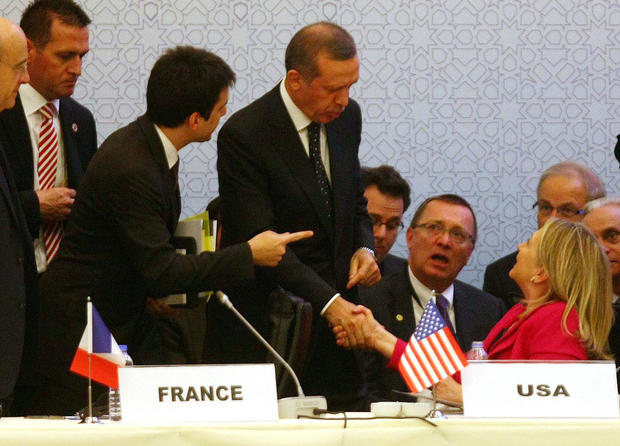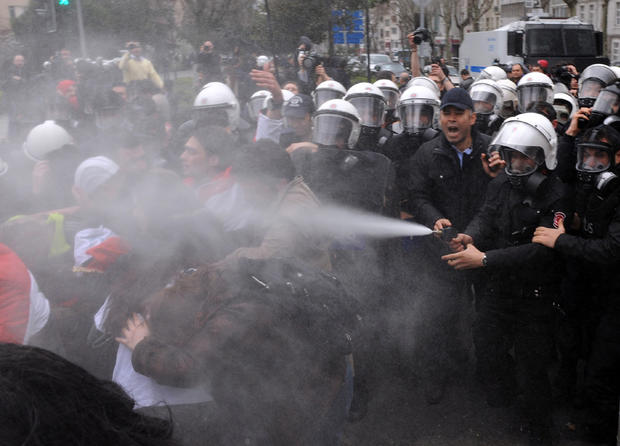Tighter sanctions sought against Syria
(AP) ISTANBUL - Dozens of countries on Sunday sought to set conditions for a new Syria, pushing for tighter sanctions and diplomatic pressure to further isolate President Bashar Assad, while urging the opposition to offer a democratic alternative to his regime.
Yet the show of solidarity at the "Friends of the Syrian People" conference in Turkey's largest city, Istanbul, was marred by the absence of China, Russia and Iran — key supporters of Assad who disagree with Western and Arab allies over how to stop the bloodshed. A peace plan by U.N.-Arab League envoy Kofi Annan has so far failed to take hold amid fresh reports of deadly violence.
"The Syrian regime should not be allowed at any cost to manipulate this plan to gain time," Turkish Prime Minister Recep Tayyip Erdogan said in an opening address.
Erdogan also indicated military options might have to be considered, if Syria does not cooperate with Annan's plan and the U.N. Security Council fails to unite in opposition to Assad. He referred to the vetoes of U.N. censure of Assad by Russia and China, which fear the measures could lead to foreign military intervention.
"If the U.N. Security Council fails once again to bring about its historic responsibility, there will be no other choice than to support the Syrian people's right to self-defense," Erdogan said.
U.S. Secretary of State Hillary Rodham Clinton also expressed skepticism that the Syrian government would observe Annan's plans, which calls for an immediate cease-fire and a Syrian-led negotiation process.
"Nearly a week has gone by, and we have to conclude that the regime is adding to its long list of broken promises," Clinton said. "The world must judge Assad by what he does, not by what he says. And we cannot sit back and wait any longer."
Syrian official: Regime won't back down
More embassy closures amid ongoing Syria violence
Activists: Syrian troops storm NW town
Clinton urged unity behind a plan that includes more sanctions, humanitarian aid, support for the opposition and the promise of justice one day for regime figures involved in atrocities. She said the U.S. is providing communications equipment to help opposition members in Syria organize, remain in contact with the outside world and evade regime attacks.
Burhan Ghalioun, leader of the opposition Syrian National Council, called for the strengthening of Syrian rebel forces as well as "security corridors" inside Syria, a reference to internationally protected zones on Syrian territory that would allow the delivery of aid to civilians. However, the nations meeting in Istanbul have so far failed to agree on such an intervention, which could involve the risky deployment of foreign security forces.
"No one should allow this regime to feel at ease or to feel stronger by giving them a longer maneuvering area," he said, reflecting fears that Assad would try to use the Annan plan to prolong his tenure. "It's enough that the international community has flirted with the regime in Syria. Something has to change."
In a statement, the Syrian National Council said weapons supplies to the opposition were not "our preferred option" because of the risk they could escalate the killing of civilians, but it appealed for technical equipment to help rebels coordinate.
"For these supplies to be sent, neighboring countries need to allow for the transfer via their sea ports and across borders," the council said.
The one-day meeting followed an inaugural forum in Tunisia in February. Since then, Syrian opposition figures have tried to convince international sponsors that they can overcome their differences and shape the future of a country whose autocratic regime has long denied the free exchange of ideas.
Syria blasted the conference, calling it part of an international conspiracy to kill Syrians and weaken the country.
A front-page editorial in the official Al-Baath newspaper called it a "regional and international scramble to search for ways to kill more Syrians, sabotage their society and state, and move toward the broad objective of weakening Syria."
In Istanbul, police used tear gas and batons to disperse a group of about 40 Assad supporters who tried to approach the conference building. Many held portraits of the Syrian leader. One man waved Chinese and Russian flags.
The delivery of humanitarian aid to Syria's beleaguered civilians is a key provision of Annan's plan. Clinton announced $12 million in additional aid for Syria's people — doubling the total American assistance so far. Germany, whose foreign minister, Guido Westerwelle, attended the Istanbul meeting, said it was nearly doubling its humanitarian contributions to 5.7 million euros ($7.6 million).
But a comprehensive solution did not appear imminent without the cooperation of the Syrian government, whose military assaults on towns and cities have forced hundreds of thousands of people to flee their homes. Syrian rebels, including army defectors, are fighting regime forces, but have been unable to consolidate their hold on territory because they are heavily outgunned.
Tens of thousands of Syrian refugees have fled to neighboring Turkey, Lebanon and Jordan, and Turkey has floated the idea of establishing a buffer zone inside Syria, if the flow of displaced people onto its territory becomes overwhelming. There are concerns that foreign intervention, even if it has a humanitarian goal, could widen the conflict by dragging in other countries and triggering a surge in sectarian tensions.
Some Gulf countries want to arm the Syrian rebels, though there is uncertainty about the composition of rebel groups and their lack of cohesion. The United States, in an election year, says military force against the Syrian government is a last resort.
The officials meeting in Istanbul aim to create a sanctions working group that will share information on who is shipping arms and money to Assad, thereby avoiding harsh sanctions aimed at forcing his regime to stop its crackdown. The United Nations estimates more than 9,000 people have been killed since the uprising to oust Assad began a year ago.
There is also a move to document the killing in Syria, collecting witness records that can be used to bring perpetrators of human rights abuses to account in a post-Assad era, whether inside Syria or through international courts.

